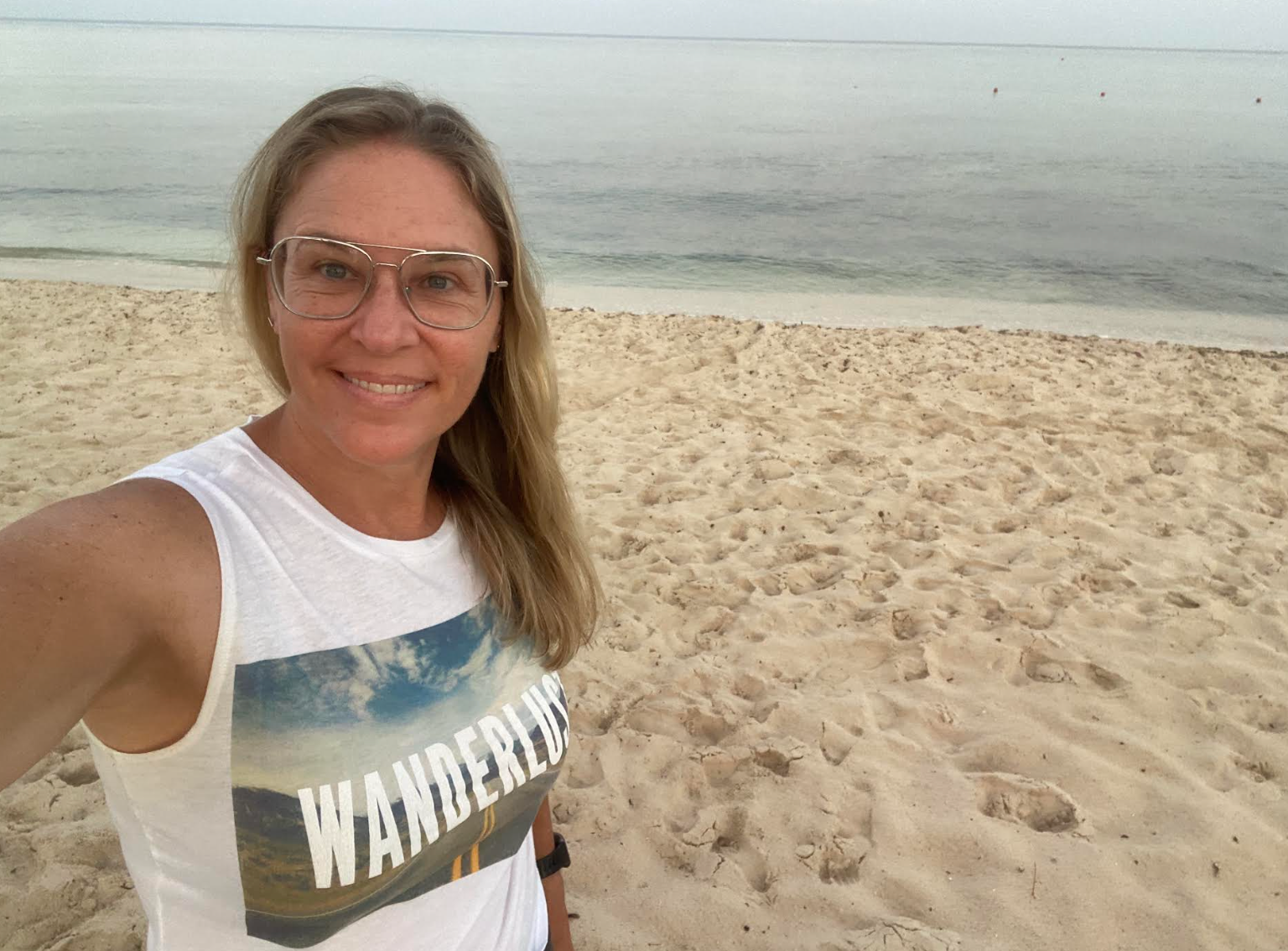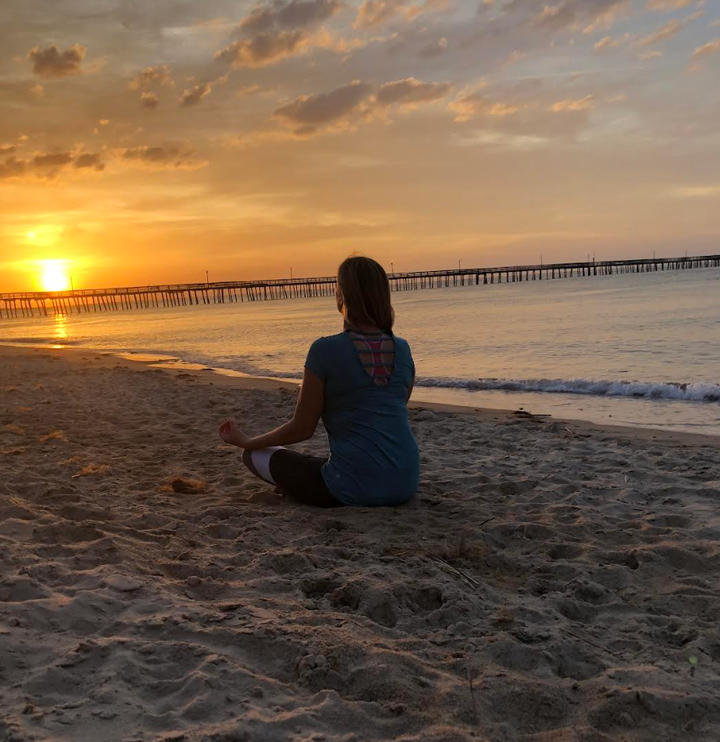My Body Went Through A Massive Change In My 40s. I Didn’t Know What Had Really Happened Until Much Later.
I could tell as soon as I placed my towel on the lounge chair at the Cozumel resort that the middle-aged woman sitting beside me wanted to chat. After our brief conversation, my boyfriend and I continued to run into her and her husband, who were on vacation from their home in England, and soon our discussions grew more personal until we found ourselves comparing menopause stories. And as my new friend shared how tough the transition has been on her, I realized not only how beneficial it is for women to talk about menopause, but also how alone I felt during menopause because I had no idea it was happening.
When painful fibroids led me to a hysterectomy at age 41, I asked fellow middle-aged friends for advice. However, other than the practical tips for taking care of myself during the recovery and the jokes about how much I was going to love not getting a period anymore, I didn’t gather any insights on the long-term changes in my body or the anticipation of menopause.
The six-week recovery was far worse than I anticipated. I was in constant pain, I couldn’t sleep, and the pain medication made me so sick I had to stop taking it. Because I kept my ovaries — my total hysterectomy included the removal of my uterus, cervix and fallopian tubes — I stopped menstruating, but I didn’t go into menopause. But for weeks I experienced night sweats, mood swings and a confusing sense of grief that I was suddenly infertile. Although those issues soon faded, I knew it was a preview of what would eventually come with menopause.
Advertisement
At the end of the six weeks, I returned to work, chauffeuring my kids around, grocery shopping and exercising as normal life resumed. The hysterectomy, the pain, the grief and the post-surgical issues were behind me, morphing into gratitude that I was rid of the fibroids that had plagued me for too long. And, yes, I thoroughly enjoyed not getting a period anymore.
All of these memories came flooding back when Emily from England confided in me on that beach in Mexico that she recently underwent a major surgery.
Advertisement
“I had a hysterectomy,” she said, lowering her voice as if she was revealing a dirty secret.
“I’m so sorry you had to go through that,” I replied. “I had a hysterectomy six years ago. It was brutal.”
Advertisement

Courtesy of Heather Sweeney
“You did?” Emily seemed surprised by my confession. “So are you postmenopausal too?”
Unlike mine, Emily’s hysterectomy included the removal of her ovaries, so menopause jump-started for her immediately following the surgery. I explained to her that, while my doctor deemed my ovaries healthy and left them where they were, I had discovered a year earlier through hormone testing that I was postmenopausal at age 47.
“I didn’t even know I was approaching menopause because I stopped getting a period after the hysterectomy and couldn’t use that as a sign,” I told Emily. “So learning I was postmenopausal and could have asked for help with my symptoms way earlier shocked me.”
Advertisement
As soon as the words escaped my mouth, I realized not only how shaken I still was that I endured menopause without knowing it — without knowing to ask for help with my symptoms — but also how isolating my experience was because I didn’t have conversations like this one, even with my doctors.
After my hysterectomy, I repeatedly asked my gynecologist how I would know I was in perimenopause — the transitional period before menopause when the ovaries begin making less estrogen — and she repeatedly told me I would simply start noticing hot flashes. That seemed oddly unscientific to me, and I kept hoping I’d get a different answer every time I asked. There was no mention of hormone testing.
When I actually did start experiencing hot flashes, night sweats, mood changes and insomnia, I decided to conduct my own research. With information from the Internet and a list of questions in hand, I booked an appointment with my gynecologist and requested hormone testing.
Advertisement
My results came through my patient portal a few days later, and I didn’t need a Google search to interpret what my numbers meant: I wasn’t perimenopausal. I was postmenopausal.
This can’t be right, I thought. Sure, I had a hysterectomy, but my gynecologist assured me that it wouldn’t speed up my menopause timeline because my ovaries remained and that I likely had many years before I had to worry about menopause. However, the numbers sitting in my patient portal didn’t lie. I had unknowingly gone through menopause and was already on the other side.
I don’t even know when my perimenopause started or how long I was in that stage. My online research told me that women who suspect perimenopause should get a baseline hormone test and repeat it periodically to track the results because hormone levels fluctuate. But I only had one test with no need to repeat it. Once postmenopausal, always postmenopausal.
Advertisement

Courtesy of Heather Sweeney
Over a million women in the United States enter menopause each year. And according to an AARP national survey, 90% of women ages 35 and over experience one or more menopause symptoms, including hot flashes, weight gain, mood swings, vaginal dryness and sleep disturbances. Not only that, but menopause puts women at an increased risk for other health issues, like heart disease, stroke and osteoporosis.
Yet, a 2023 study revealed that approximately 94% of American women reported never learning about menopause in school and 49% didn’t feel informed about menopause at all.
Advertisement
Furthermore, a recent study released in February 2025 that addressed the fact that women feel both unprepared to face menopause and unsupported by their health care systems during this phase, found that “a significant number of individuals aged 30–45 years experience perimenopause-related symptoms.” The results highlight the need for more perimenopause education, even for women in their 30s.
When focusing on physicians’ roles, another study found that only about 20% of doctors in American obstetrics and gynecology residency programs had formal menopause training. So even if women seek professional advice and treatment for their menopause symptoms, there’s a good chance their doctors won’t fully know how to properly provide it.
Given my own lack of knowledge surrounding menopause, my gynecologist’s lack of guidance, and my conversation with Emily, I’m not surprised by these statistics.
Advertisement
After receiving my test results, I went on hormone replacement therapy (HRT) for a year. A few short weeks after applying my first estradiol patch, the shift was life-changing. The night sweats and hot flashes stopped. My moods leveled off, and I no longer fought bubbles of rage building up at the slightest stressor. My sleep improved, and I lost some weight. I was no longer baffled by my body and my emotions, no longer wondering if all my symptoms were a figment of my imagination, no longer waiting for a doctor to offer some insights.
Most importantly, I learned that it was up to me to advocate for my health — because no one else will.
The more I shared with Emily during our vacation chats about my hysterectomy and menopause, the more she shared about her journey. Her surgery recovery was slow and painful. Months later, she still struggled at her job, where she worked with young children and wasn’t able to sit on the floor with them like she once did. Her instant menopause led to instant weight gain, her moods were all over the map, her sleep was disruptive, and she wasn’t sure her HRT was working. She was exhausted — physically and emotionally — with a sense of hopelessness that she would never feel normal again. Maybe worst of all, she’d been keeping it all inside, trying to push through, not confiding in anyone but her husband, who obviously couldn’t relate.
Advertisement
Tears shimmered in her eyes as I empathetically told her I went through everything she described. I too wondered if the HRT would work, but eventually my symptoms abated. I too struggled with weight gain, but I found that walking 10,000 steps daily, lifting weights and cutting down on sugar helped me lose those stubborn pounds. And I too felt alone, but talking with other women and doctors about menopause without shame or embarrassment can temper that loneliness.

Courtesy of Heather Sweeney
I look back and realize I wasn’t proactive enough when I first suspected I was menopausal. Combine my silence with the fact that my doctor never suggested regular hormone testing after my hysterectomy or offered me a checklist of other symptoms besides hot flashes, and the result is that I likely suffered unnecessarily for months — possibly years.
Advertisement
Emily thanked me for helping her feel less alone, a feeling I wish I’d had while enduring the worst of menopause. I never saw her again after that heart-to-heart talk, but I hope she’s back in England healing, practicing patience and kindness to herself, and maybe sharing her experience with other women so they feel less alone with their menopause too.
While I’m encouraged that more studies are being done and more news segments are calling attention to menopause, women’s health needs to be discussed more, at every age and stage. We know our bodies. We know when something needs to be addressed by a doctor. And we need to know that it’s up to us to advocate for our own health.
Heather Sweeney’s work has appeared in The New York Times, The Washington Post, The TODAY Show, Newsweek, Business Insider, Good Housekeeping and Healthline, among others. Her memoir, “CAMOUFLAGE: How I Emerged from the Shadows of a Military Marriage,” will be released in fall 2025. You can learn more about her at https://www.heatherlsweeney.com and follow her on Instagram, Bluesky and Threads.
Advertisement
Do you have a compelling personal story you’d like to see published on HuffPost? Find out what we’re looking for here and send us a pitch at pitch@huffpost.com.

Comments are closed.